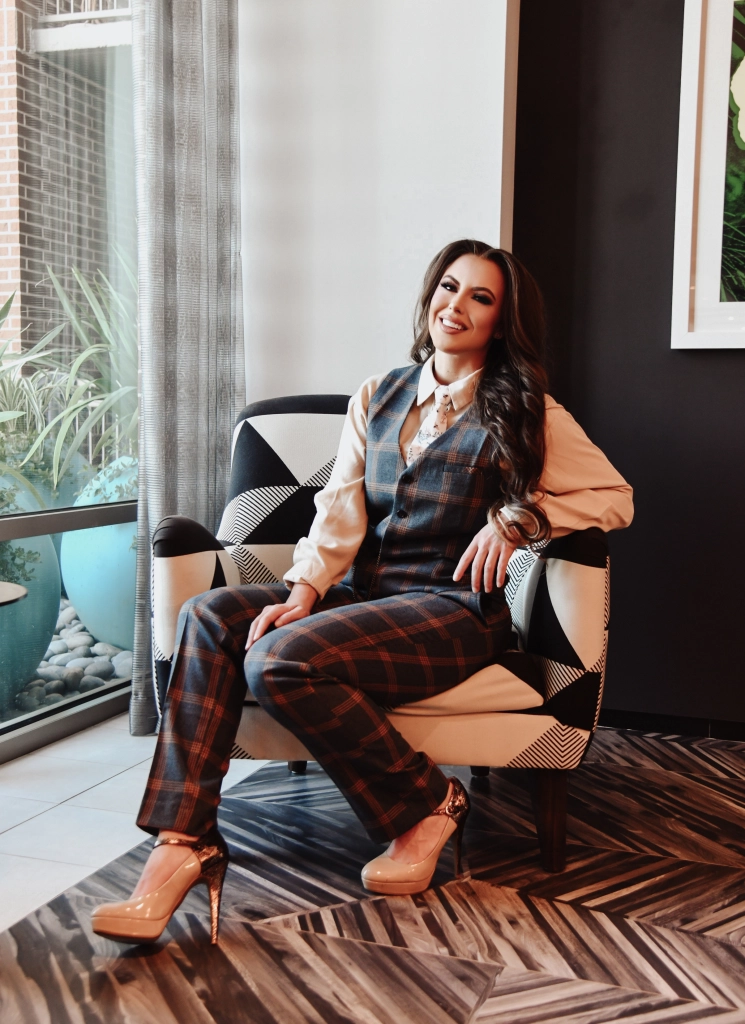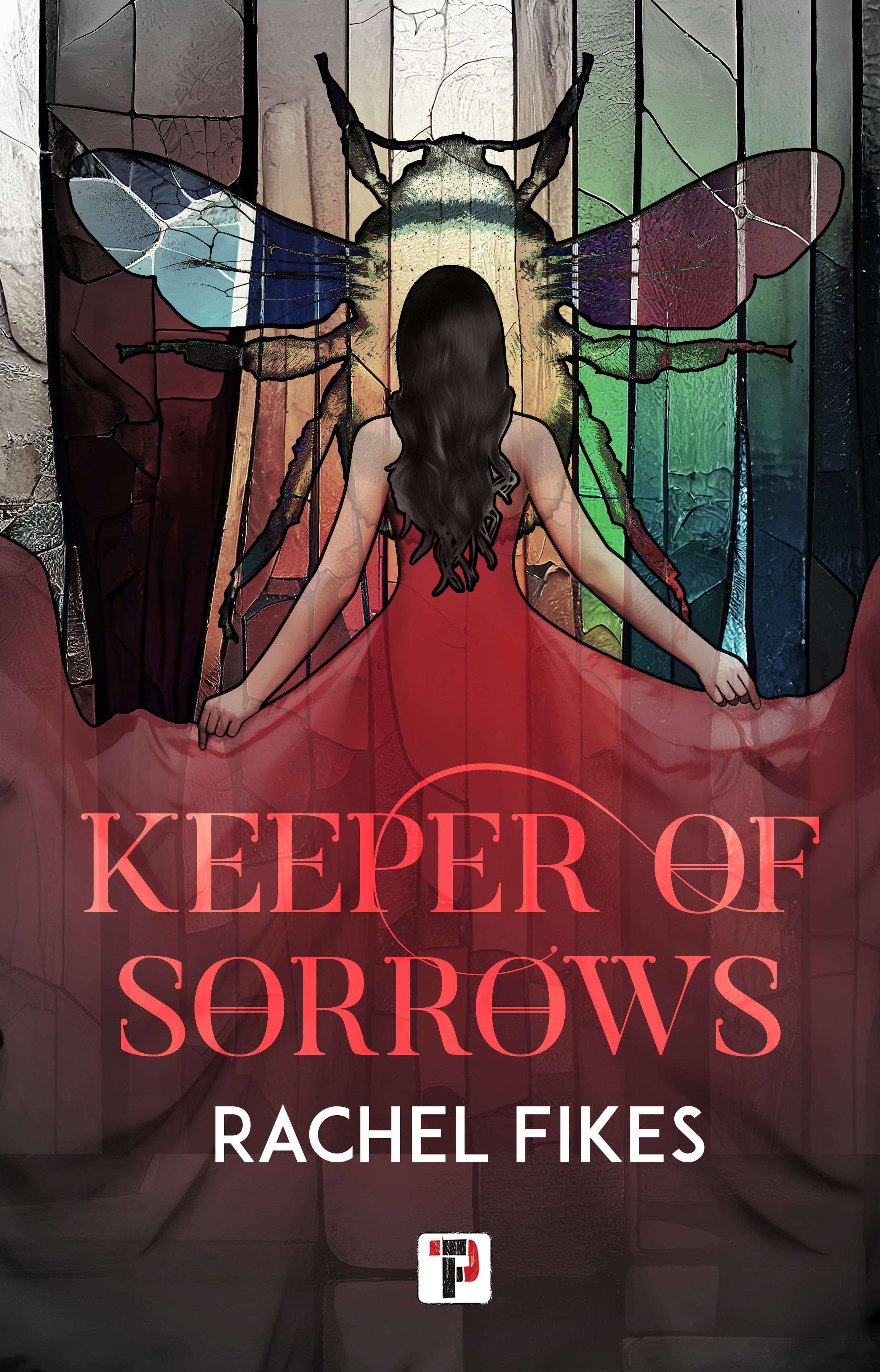Some Thoughts with ... Rachel Fikes
19 Sept 2024The Author/s

Rachel Fikes
A former soldier, Rachel deployed to Iraq (OND) and Afghanistan (OEF) before finding her voice in dark fantasy. When she’s not writing, she’s likely enjoying a local brew—be it coffee or booze, and reading to her plants or irritating her Austin neighbors as she attempts to play the bagpipes.
The Interview
1.- Could you introduce yourself to Jamreads’ readers?
Heya folks! I’m a writer from the Texas Hill Country, and my debut novel Keeper of Sorrows just came out in September. Before finding my voice in dark fantasy, I was a soldier, maid, door-to-door bookseller, farm hand, leasing agent, baker, journalist, pageant queen/director, wiper of butt sweat (tanning salon), seller of overpriced lingerie, and dejected cashier (all of which I either strategically retreated or succumbed to my injuries).
Eventually, with skin thicker than chain mail, a shield of resolve, and the reckless, indefatigable hope of a warrior poet, I finally fought my way into publishing. These days, when not writing or teaching, I’m likely enjoying a local brew—be it coffee or booze, reading to my plants, or irritating my neighbors as I attempt to play the bagpipes.
2.- How did you start writing?
After writing and illustrating a book for a fifth-grade homework assignment, I fell in love and decided right then and there–I wanted to be a writer. It would be a quarter of a century later, though, five novels and hundreds of rejections before I finally sold the debut you’re holding in your hands today.
3.- What inspired you to write Keeper of Sorrows? How did the first idea evolve into the book we have in our hands now?
Ooooh. So. Many. Things! *Proceeds to make you regret asking this question
I’m a farm kid. Agriculture is in my blood. In fact, my undergrad is Ag Journalism. I know, I know. Only in Texas. Anyway, when it comes to growing things, pollination is kind of essential. While bees are the most well-known, butterflies, moths, ants, bats, birds, beetles, and even wasps (despite us not wanting to admit those stinging jerkoffs serve a purpose) also add to 80% of pollination by critters. That other 20%? The water and wind. The latter, of which, I decided to tinker with.
Because without it, our world would transform into a planet of stark contrasts. Wetlands and deserts and extreme hots and colds. Razing ecosystems and humans alike. And since sibling rivalry is at this novel’s core, why not have a jealous brother deity steal the wind from his sister’s world?
Most folks today know the honeybee population is on the demise. It’s troubling. We need to do something about it. But growing up in an uber religious household, I’m not particularly interested in picking up a book that’s going to preach and make me feel like garbage. I have enough latent Christian guilt as it is. Even if I’m an agnostic convert.
Instead, I set up a world that’s wholly dependent on a single bee species—the Humblebee. A fantastical hybrid of Honey and Bumble because 1) I love both and couldn’t decide between the two and 2) the name makes me grin like a goon. After all, bees keep our world going around, requiring no praise nor pat on the back. That’s just what bees do.
Bees, like many insects, are a matriarchy. More, because of their fascinating breeding, the sister bees share more genetic code with one another than they do their mother. According to the Haplodiploidy Hypothesis (have a couple drams of whisky, then say that five times fast. Hah, say it once sober), sister bees are predisposed to higher degrees of altruism. In layman’s terms? Sisters are innately programmed to selflessly serve one another.
Bam! What a perfect juxtaposition to the sticky, frustrating, confusing love between sisters that unfolds in KOS as Naokah searches for her big sister. A complicated love I know too well. I have two sisters. One older, one younger. I have two younger brothers too, but I’ll alienate them in the next book, heh.
I will also admit that, before writing this book, I wasn’t that different from where Naokah is at the start. In that, I was terrified of bees. I think many people are. I blame books and film for turning them into swarming villains. I wanted to change that. Luckily, I have a couple of patient and wise beekeepers in my life who helped show me how special these teeny creatures are. My literary agent Naomi and my sister Rebekah. Hmmm... Put those bold letters together. Might they spell my leading lady’s name?
Along with pestering my resident beekeepers, I delved into research. I spent quality time with my sister’s bees. I learned about wonderful organizations like Hives for Heroes, a nonprofit whose mission of conservation and sustainability helps soldiers transition into the civilian sector via their national network of beekeepers. Bees are healing. The closest thing to magic I’ve ever experienced. Their resonance can help soothe veterans suffering from PTSD.
So, as Naokah grew to understand the bees and overcame her fear, so did I. That’s the basis of most fears, no? The unknown. Once we change perspective, we often debunk some pretty wild misconceptions.
My creepy little book is a homage to bees. A celebration of their short, but no less important lives. I want readers to be entertained, sure, but I hope they are moved too. And if they do fear bees, that KOS gives them the courage to look at these important pollinators from a different angle. Maybe not stick their head into a hive or run off to be a bee charmer. But to admire and respect our wee fuzzy friends, or at the very least, plant a flower or ten.
4.- Bees play an important role in your novel. Why do you think they are so fascinating for you?
I blab on for sooooooooo long in the aforementioned question, but I believe I answered this above, hehe?
5.- Could you tell us more about how you got representation by your current agent? How was the process of pitching this book to editors?
Oh, what a journey it’s been, my friend! My first two novels (one, a horror novel, written at uni in 2005, the other, a military thriller, written in Afghanistan in 2013) were absolute garbage. But I didn’t realize that at the time. I queried hundreds of agents and received hundreds of rejections. I hadn’t found my voice yet. It wasn’t until 2017, when I decided to write my first fantasy novel that I produced something commercially viable.
But even then, I had to complete two R&Rs (revise and resend) before my dream agent Naomi Davis signed me. Still, I was incredibly naive. I assumed once I signed with an agent, I’d be published ASAP. Nope! Book three was pitched to editors the year of the pandemic, and it died. So, I wrote another during the pandemic. It, too, died on submission. Book five (Keeper of Sorrows!) was the one that finally found a home with Flame Tree Press.
If you’re looking to get published, I’ve compiled alllllllllllll the resources that helped me, and you can also check out the query letter that landed my dream agent!
6.- Keeper of Sorrows was officially launched at Glasgow Worldcon. Could you tell us more about this experience?
KOS wasn’t “officially” launched at WorldCon, but on September 3rd at BookPeople in Austin, Texas. But yes, my amazing publisher did surprise me by selling some early copies there. And wow! What a feeling! I was ecstatic and terrified, especially signing books for readers the very first time. My handwriting is atrocious, and I feared I’d screw up. Overall, it was a lovely experience meeting so many wonderful readers, writers, and publishers. I highly recommend attending!
7.- Why do you think LGTBQ+ representation is important in literature?
As someone who spent most of her life in the closet–I didn't come out as pansexual until recently–it was important and necessary to write a queer protagonist. I knew I liked girls when I was eleven-ish, but I grew up in a religious household in a very conservative town, and that's not something you would talk about.
I do think, however, if I'd encountered more books that had characters with identities similar to mine (I’m talking main characters, not the token queer character), I would have had more courage to express myself and be vulnerable and reveal my true self.
But I didn't. I didn't see books like that at all. So, I'm hoping that KOS, meant for upper YA and adults, gives someone the courage to be themselves. That it doesn't matter what their background is. They, too, can be a hero.
8.- Gothic seems to be evergreen in speculative fiction. Why would you say it is so beloved?
As humans, we’re both blessed and cursed knowing about our eventual demise, no? We all want to know what happens after. Is there an after? Gothic literature delivers frightening possibilities in such romantic ways. There’s something undeniably unnerving yet intriguing about a decaying castle haunted by a ghost who died under mysterious circumstances. A dark family secret, hidden beneath layers of dust and deceit and psychological despair. Gothic literature is timeless, bringing up questions of morality, confronting past trauma, and delving into our darkest fears. All enduring curiosities, that we as readers–thankfully!–can explore beneath cozy blankets in the safety of our own homes. Bonus points if it’s not just raining outside, but Poe-ing. Hehe. Sorry. Just saw this t-shirt and had to go for it. Seriously, though. What’s not to love?!
9.- What does Rachel Fikes like to do in her free time?
Oops! Answered this in my introduction, heh.
10.- What can we expect from Rachel Fikes in the future?
More psychological f*ckery! More creepy castles and hauntings and deliciously dark atmospheric settings. The gothic, for me at least, is here to stay.

You can order Keeper of Sorrows using this link. And signed copies from Bookpeople in this other link.
